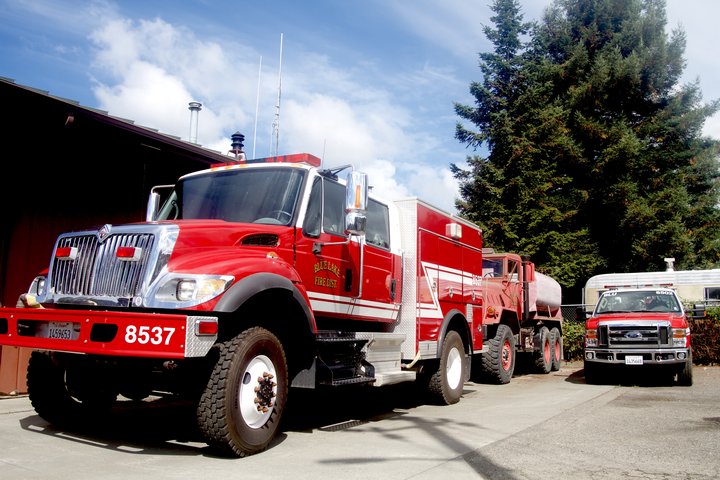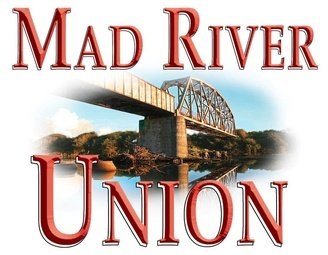
The Blue Lake Volunteer Fire Department needs an indoor space to store vehicles. | Patrick Evans, Union.
The Blue Lake Fire District, which manages the
Blue Lake Volunteer Fire Department, will lose a large part of its
income when a service agreement with the Blue Lake Rancheria expires
in 2019.
In response, the fire district has submitted a special tax measure for the consolidated district election in November to plug the anticipated gap in funding and cover rising costs of operations and maintenance.
The Blue Lake Fire District receives $75,000 per year from the Blue Lake Rancheria, which mostly covers the salary of the district fire chief. The Blue Lake Rancheria entered a service agreement with the district to fund the Fire Chief’s salary in 2006, but decided it will not renew the agreement when it expires in June 2019. The Rancheria was not available for comment before the Union went to press.
The fire district’s proposed tax, Measure Y, would raise an estimated $109,000 per year for the district. Measure Y would begin in the 2018-2019 fiscal year, establishing a flat tax rate based on the use of taxable property. The lowest tax would apply to vacant and unimproved property at $75 per year, while the highest tax would fall on industrial property at $400 per year. A single family residence would pay $125 a year.
Measure Y would replace a special tax passed in 2000 which raises about $40,000 per year for the district, or 17 to 18 percent of the district’s $250,000 annual operating budget, according to Fire Chief Ray Stonebarger.
Stonebarger said his position will likely be eliminated if Measure Y fails and the district does not find other revenue sources.
The district also needs to cover the cost of renovating the Blue Lake fire station or building a new structure to accommodate more engine bays.
The department has outgrown the capacity of its fire station, originally built in 1976, and two of the department’s engines are parked outside year round. The inadequate storage is taking a toll on vehicles and equipment Stonebarger said.
“It’s a great recipe for failure,” he said.
The department parks one of its water tenders and its wildland urban interface engine, a fire truck capable of responding to emergencies in urban and rural or wilderness areas, outside during the summer. During the winter the wildland engine is taken out of service and stored inside where it is picked over by rats, while the department’s water trucks are left outside to endure the harsh Humboldt winter and rust away.
“Last year we had a water tender that rusted through the tank, rotted the tank, rotted the brackets that hold the tank on the frame,” Stonebarger said.
The water truck was only 20 years old, 10 years shy of its replacement date, but had to be taken out of service. The cost of replacing engines has almost doubled in the past decade. The department’s newest engine was purchased in 2002 for $262,000, while a fire engine now costs $425,000, Stonebarger said.
If Measure Y fails the department will struggle to keep vehicles and volunteer firefighters in the field Stonebarger said. He predicts that the department will lack up to date equipment and adequate training for volunteers.
“It puts the community at risk and firefighters at risk, it’s hard to put volunteers in that position,” he said.
Stonebarger has been a member of the Blue Lake Volunteer fire department for 30 years. The department has changed tremendously in that time he said, expanding operations and securing funding with the help of grants and service agreements.
“We’ve been living our life on grants, trying to survive, I’d really like to see the community help us,” Stonebarger said.
The role of the department has become more complicated he said. Volunteer firefighters deal with fires caused by new fuel types, vehicle rescues made more technical by changes in car construction, and more frequent calls for drug related medical emergencies.
“Nothing has gotten easier,” Stonebarger said. Maintenance and training has to match the increasing difficulty of the work and the district’s income has to match the increasing cost he said. “As things start breaking down, we just are not gonna be able to respond, that’s the whole fact of it.”
###
Patrick Evans writes for the Mad River Union. Subscribe here.

CLICK TO MANAGE